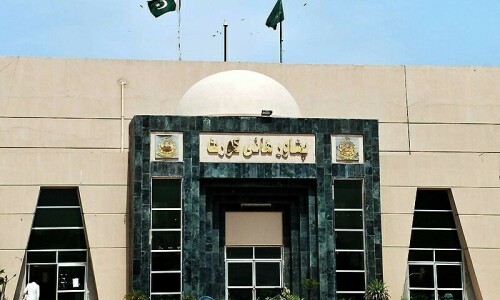ISLAMABAD: The federal cabinet on Tuesday approved abolition and merger of 82 departments and agencies falling under six federal ministries and divisions into 40 in the first phase of the rightsizing of the federal government.
The meeting of the federal cabinet, presided over by Prime Minister Shehbaz Sharif, at the same time constituted a committee to suggest measures required for protection of rights of the employees to be affected by merger and abolition of these departments and organizations.
The cabinet also formally approved the continuation of austerity policy involving complete ban on purchase of new vehicles, equipment, fresh employment and foreign visits on public expense.
An official statement quoted the PM as saying that new smart management systems and digitization were being introduced in the government sector to develop the country’s governance structure on modern lines and international best practices. He said the measures for improvement of governance and institutional reforms were being taken on a priority basis.
Reforms committee suggests elimination of 150,000 vacant positions, outsourcing of non-core functions
Finance Minister Muhammad Aurangzeb presented recommendations of the committee on rightsizing of the federal government and said in the first phase, enforcement of the committee’s recommendations has begun in six ministries. This would help improve performance, better utilisation of human capital, and an end to unnecessary inertia in policymaking as well as end unnecessary delays in implementation of decisions through strengthening of only essential departments.
For this, these 82 entities would be transformed into robust institutions through digitilisation, smart management, efficient governance, transparency, and swift implementation to provide better facilities to the common man. “The federal cabinet while approving these recommendations, constituted a committee for protection of rights of the employees to be affected by the mergers and dissolutions”, an official statement said.
The reforms committee suggested abolishing around 150,000 vacant positions and proposed outsourcing non-core functions such as cleaning and janitorial services, leading to the gradual phased elimination of various posts in grades 1 to 16. The committee also recommended a complete ban on recruitment on contingency posts and supervision of the finance ministry over cash balances of the ministries, the government had announced during a briefing to the PM on these consolidations and mergers a few days ago.
The cabinet was also given a briefing on reduction in government expenditures and austerity policy of the prime minister. The cabinet approved the continuation of the austerity policy introduced by the previous PML-N government. This includes no salary to cabinet members on volunteer basis, ban on purchase of vehicles at public expense except unavoidable cases like ambulances, purchase of new equipment and machinery, creation of new posts in the public sector and unnecessary foreign travels at public expense and medical treatments abroad, the statement said.
The cabinet was told that $130 million worth of saving had been made by stopping the import of urea and instead of providing uninterrupted gas supply to urea factories. The prime minister appreciated the decisions taken by the ministries of finance, energy and national food security to have ensured provision of unhindered supply of urea fertilizer during the current and upcoming cropping season.
Under the overarching direction, the rightsizing committee is seeking abolition of regulatory bodies of the devolved subjects, particularly health and education, contain transportation related expenses and phase out non-executive staff. The government has been under severe criticism over a tough federal budget and higher energy costs that caused financial pain to almost all segments of society in its attempt to secure $7bn economic bailout from the IMF without effective and matching expenditure control of the public sector.
Legislative process will begin immediately for the implementation of these measures through enabling changes to federal and provincial laws as many of these entities had been created through some legislative instruments.
Federal universities and hospitals would then be run by corporate boards in the private sector on Public-Private Partnership model for profitability and linkage to the market. There would be complete ban on appointment of staff to federal universities and hospitals except for academic staff that would be hired on lump sum remuneration package without any future liability on the federal exchequer.
In addition, there would be a freeze on recruitment of grade 1-16 employees across the federal government and gradually such posts would be abolished at the time of their vacancy. The officer cadre would be required to embrace artificial intelligence and digital tools instead of their heavy reliance on support staff at present. The staff of devolved ministries and their related paraphernalia would be transferred to the surplus pool with the option for their transfer to the provinces or vacant seats fall in other organisations.
Published in Dawn, August 28th, 2024

















































Dear visitor, the comments section is undergoing an overhaul and will return soon.